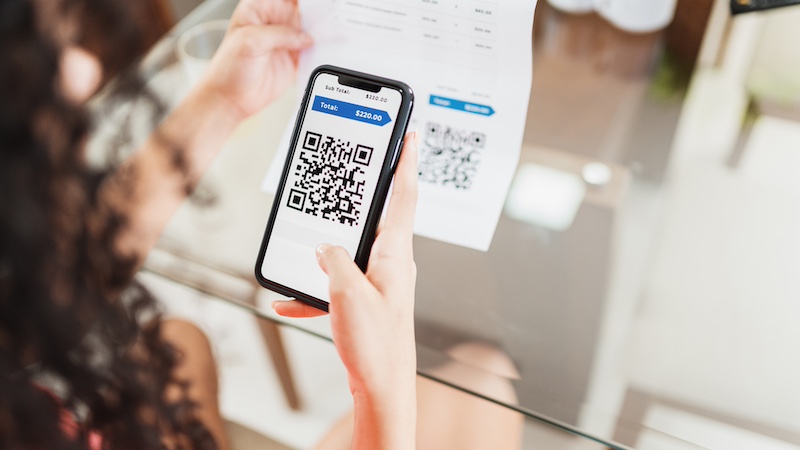
Criminals have discovered the QR code for the “quishing” scam. After fake letters from credit institutions, fake parking tickets with QR codes are now in circulation. We’ll explain what you should pay particular attention to when it comes to QR codes.
At the beginning of August 2024, the Lower Saxony State Criminal Police Office warned of the new “quishing” scam. At that time, the focus was primarily on letters that allegedly came from banks and credit institutions.
These were supposedly intended to provide information “about an important matter relating to” bank accounts. It also included a QR code that recipients could use to confirm their identity.
But these were fake codes that criminals wanted to use to steal money or data from their potential victims. The so-called quishing – i.e. phishing via QR code – is no longer limited to bank letters. Fake parking tickets and false QR codes at charging stations for electric cars are now in circulation, as the Federal Association of Consumer Organizations (VZBV) warns.
Quishing: Fake traffic tickets with QR codes in circulation
QR codes are an easy way for criminals to dupe their potential victims. Because the encrypted representation makes it impossible to see at first glance what information is stored.
The target website to which the QR code leads is also not directly visible. To do this, it must first be scanned with the camera of a smartphone. However, caution is advised.
Because cybercriminals take advantage of this. In the case of fake bank letters, for example, access data for online banking can be accessed. According to the State Criminal Police Office of North Rhine-Westphalia In some cases, money transfers are also initiated directly via these QR codes.
Fake traffic tickets and QR codes at charging stations
But it’s not just bank customers who are the focus of the new “quishing” scam. Drivers should also be careful when scanning QR codes in the future.
Cybercriminals also try to collect payments using fake traffic tickets with QR codes. In some cities, penalty cells contain QR codes that drivers can use to pay their fines directly.
Criminals are now handing out fake traffic tickets that also contain QR codes. According to the VZBV, this is already known from Berlin, among others.
Fake QR codes also appeared at charging stations for electric cars in August. Here too, criminals are targeting direct payment transactions. Because the regular QR codes point to the provider’s payment page.
This is how you can protect yourself from “quishing”.
To avoid falling into the trap of fake QR codes, you can take a few precautionary measures. Basically, it is advisable to only scan a QR code if you are sure that it is legitimate.
If you are unsure, you should set your scanner so that it does not automatically open the website stored in the QR code. Instead, display the URL beforehand so you can check it.
If you have received a traffic ticket and are not sure about its authenticity, you should, as a precaution, go to the police and clarify the matter, according to the VZBV.
If you receive fake letters from your bank, it may be advisable to contact them by phone. Here you can ask whether this is a real contact or not.
For charging stations for electric cars ADAC advises thisespecially not to scan QR codes that are pasted over. Charging stations can usually also be used via an app or with a charging card, so you can avoid having to scan a QR code.
Also interesting:
- AI training: Renowned US websites block Apple bot
- Fraud: Be careful with job offers via WhatsApp, Telegram and Co.
- Manipulation on the Internet: What are Dark Patterns?
- Are QR codes safe or an unrecognized risk?
The post Fake traffic tickets with QR codes – the “quishing” scam is becoming increasingly bold by Maria Gramsch first appeared on BASIC thinking. Follow us too Facebook, Twitter and Instagram.
As a Tech Industry expert, I am deeply concerned about the rise of fake traffic tickets with QR codes, also known as the “quishing” scam. This scam is not only deceptive and illegal, but it also poses a serious threat to public safety and security.
The use of QR codes on fake traffic tickets is a clever tactic by scammers to make their fraudulent schemes appear more legitimate. By scanning the QR code, unsuspecting victims may unknowingly provide sensitive personal information or even download malware onto their devices.
It is important for individuals to be vigilant and cautious when receiving any type of communication regarding traffic violations. They should verify the legitimacy of the ticket by contacting the appropriate authorities directly, rather than relying solely on the information provided on the ticket.
Additionally, law enforcement agencies and technology companies must work together to combat these scams and protect the public from falling victim to fraud. This may involve implementing stricter verification processes for issuing traffic tickets, as well as educating the public about the dangers of QR code scams.
Overall, it is essential for everyone to stay informed and aware of the latest tactics used by scammers in order to protect themselves and prevent further exploitation.
Credits